- Home
- Nichole Christoff
The Kill Chain Page 4
The Kill Chain Read online
Page 4
And while I had no idea why these agents thought I might be harboring evidence of criminal activity, I knew a few things for sure. The evidence they sought wasn’t flat. It wouldn’t fit between the pages of the book. Likewise, it wasn’t large. It was small enough to be secreted in a dresser drawer or a seat cushion.
As I mulled that over in my mind, a female agent, with a coffee stain blooming on the blouse she’d hastily shoved into her trousers’ waistband, appeared. Special Agent McIlvoy waved her in my direction. And I realized she’d have the honor of watching over me as I got dressed—just in case I tried to stuff any incriminating material into my pockets.
She didn’t look happy about her assignment. In fact, she didn’t look like an FBI agent. With round, rosy cheeks and mouse-brown hair she’d yanked into a topknot, she appeared young enough to be a college student. But she removed my handcuffs, so that was something. She didn’t hesitate to chase a pair of agents from my walk-in closet so I could get dressed in some semblance of privacy, either.
On the threshold, however, she snagged my arm.
“If you’ve got any weapons in this closet,” she warned, “I’d advise you to tell me now.”
In the right hands, nearly anything could be a weapon, but I knew what she meant. My Beretta 9000S would probably be none the worse for wear after its dunking in the waters of Hickey Run, but right now it was tucked up in my gun safe downstairs, having been field-stripped, flushed, dried, oiled, and reassembled. My little Beretta Bobcat was in the small strongbox built into my nightstand. The agents working their way through my bedroom were likely to find it soon and I knew I’d be obliged to open it when they did. I told my FBI babysitter as much, but she still regarded me as if I were a convicted felon as we stepped into my closet.
Under her watchful eye, I grabbed a lightweight green silk sweater, scuttled my jammies, and hauled the garment over my head. I quickly teamed the sweater with tan pants and brown ankle boots. The blazer I’d worn to the Patriot’s Cup lay where I’d dumped it, on the tufted bench against the far wall. Figuring I could use its professional polish after getting caught in pink PJs, I snatched it up and shoved my arms into the sleeves.
The agent and I emerged from the closet just as the landline on my nightstand began to ring. Not many people had my home number. Without waiting for permission to answer it, I seized the receiver.
“Jamie?” The voice of my office manager, Laura Rygaard, trembled along the connection. “I’m at the office. I think you’d better get down here right away.”
“Let me guess,” I said. “A whole collection of federal agents woke you up, dragged you down there, and now they’re snooping through the file cabinets.”
“They’re practically taking your desk apart.” Laura sounded close to tears. “And they’re demanding I give them every contract you signed over the past year.”
But those contracts wouldn’t just have my signature on them. The feds were about to get their hands on my confidential client list. And no private investigator worth her salt would allow that to happen.
“Stall,” I ordered. “And call Daniel.”
Daniel Adair wasn’t just one of the best lawyers in the District.
He was also my lawyer.
“I’ll get to the office as soon as I can,” I promised Laura. “I’ve got my hands full here, but—”
“Jamie, if they’re raiding your house, too—”
“Don’t worry—”
However, I never got to finish that thought.
Because Special Agent McIlvoy plucked the phone from my hand.
He hung up on Laura. “You’ve got company, Ms. Sinclair.”
Past Agent McIlvoy, four more men in dark suits shouldered their way into the room. Their starched white shirts were so stiff, they’ve could’ve been cut from card stock. Each wore a somber necktie: bark brown, dark wine, forest green. But the point man wore a black tie. And he bypassed McIlvoy like the FBI agent wasn’t even there.
“Jamie Sinclair.” Black Tie’s voice rumbled like a semitruck on a rough stretch of road. “Come with me.”
“Where are we going?” I asked.
“You have an appointment.”
I shot a glance at McIlvoy. This was his raid. But he’d eased back to make way for Black Tie.
I didn’t like the look of that.
“Let’s go,” Black Tie said.
He snapped a cuff on my right wrist and then the left.
And I liked that even less.
When I stepped outside, shepherded by Black Tie’s compatriots, I almost didn’t recognize the street beyond my own front door.
The brick pavement of the narrow Old Town avenue was still crammed with my neighbors’ cars bearing the appropriate parking permits and tucked nose to tail at the curb for the night. In front of my townhouse, the FBI’s bulky SUVs and fleet sedans hemmed them in. Past them, like bookends, patrol cars belonging to Alexandria’s own law enforcement officers had cordoned off a neat chunk of the street. Their rolling blue and white rack lights painted everything in flashing patches of sapphire and topaz. However, I doubted they were here to block traffic for Agent McIlvoy’s benefit—because, crouched in the center of the street, a black helicopter had touched down on the age-old brick.
Black Tie bundled me into the back of the hulking bird. One of his cronies sat on either side of me, just in case I got a crazy idea about diving for the street. My stomach went into free fall as the chopper lifted clean into the air.
The aircraft swung northward. The stately trees studding the sidewalk below whipped back and forth in the wash of the rotors. In seconds, I got a bird’s-eye view of King Street and the George Washington Memorial Parkway, morning commute mainstays. But no traffic clogged these arteries so early in the day. In fact, in mere moments, we traveled all the way from my neighborhood to the forbidding waters of the Potomac.
Across the river, the Washington Monument rose from the National Mall like a spear of pure white ice. The red warning light that topped it winked like a lazy eye. On the Virginia side, the United States Air Force Memorial, graceful arches swooping skyward like contrails in the Bomb Burst formation, gleamed an iridescent blue. And nestled beside it, on the Potomac’s southern shore, stood an iconic five-sided edifice.
The Pentagon is the largest office building of its kind in the world. Five stories tall, with five concentric sections inside, it takes more than seventeen miles of corridors for military personnel and civil servants to get where they’re going. It’s home to the top brass of the United States Army, Navy, Air Force, and Marines. The Secretary of Defense occupies a large chunk of its real estate, too. But smack dab in the center of it, it boasts a grassy courtyard that few civilians ever see.
As a teenager, I’d perched on one of its park benches to eat ice cream while a jaded captain at least ten years my senior tried to entertain me with a recap of the last Washington Redskins game. The poor man had been ordered to keep an eye on me while my father, a major general by that time, attended the last of a series of meetings inside. Now that courtyard was awash in white light as bright as sunshine—and our helicopter set down right in the middle of it.
The uneasiness that had dogged me since the FBI had burst into my bedroom cranked up another notch. Because there was no earthly reason for the chopper to set down in the Pentagon’s courtyard. Not when the place came equipped with a perfectly good helipad or three.
Half of my escort hopped out of the bird. The guy in the jump seat beside me urged me to follow suit. When my feet were on the ground again, Black Tie gripped my arm. With his centurions flanking me, he steered me down a series of sidewalks and through a sensible steel-and-glass entrance.
In the corridor inside, he nudged me onto an elevator. Wine Tie produced a pass card. He zipped it through the reader mounted below the control panel and Black Tie punched a button on th
e lower left.
As the lift swayed into motion, my patience snapped.
“Okay, fellas. Why don’t you tell me what this is about?”
I got no reply.
The elevator shuddered to a halt. It opened on another corridor. A dozen doors, flat black with electronic locks and keypads with glowing yellow eyes, flanked both sides of the hallway. Industrial carpet muffled our footfalls. Until we reached a door that had more locks on it than the rest.
Built into the wall beside the jamb was a panel. The panel was no bigger than a shoe box. A latch held it closed. Green Tie released the latch. He flipped it open. The recessed cubbyhole behind the hatch was lined with sheet metal. And it was empty.
“Turn out your pockets,” Black Tie told me.
I knew what he wanted. He wanted my cellphone. Because the lining of the cubby built into the wall was meant to cut off signals to and from the outside world. This was a strategy to reduce spying, both the intentional kind and the kind where someone else manages remote control of your phone’s mic, camera, and other operations.
Of course, my phone was a soggy ruin after its soaking in Hickey Run. I’d left it in the mudroom back at my place. But I didn’t bother to point that out. Instead, I dug into my jacket pockets, first one and then the other. And that was no small feat in handcuffs.
From the right pocket, I extracted my skinny kiss-lock wallet and a miniature leatherette notebook, complete with a slim golden pen. The guy in the bark-brown tie examined them briefly before palming them off on Black Tie, who stashed my belongings in the metal cache. In the left pocket, I found absolutely nothing—except the soft folds of a paper cocktail napkin.
I pulled it out, looked closely at it. The logo of the Patriot’s Cup was stamped on one side of the paper. But on the other, in black ballpoint, was Nathan Rappaport’s phone number and nine little words.
Your new friend isn’t who she says she is.
Chapter 6
Rappaport’s claim electrified me. And I couldn’t let these guys see it. Not with their undeclared intentions.
I crushed the napkin in my palm.
And Black Tie took exception to that.
“Open your fist,” he demanded.
I did. The napkin lay in the vibrating cup of my hand like a crumpled treasure map. Black Tie reached for it.
In an instant, I jerked the ball of paper to my face, dabbed my nose with it, and cleared my throat for good measure.
“Sorry.” I shrugged. “I’m sure it’s just hay fever.”
Black Tie’s lip curled like I’d exhibited symptoms of the plague.
And he didn’t say a thing when I returned Rappaport’s message to my pocket.
One of the guys slammed the cubby’s panel shut. Another entered a series of codes into the door’s locks and swept it wide. Black Tie nudged me through it.
I found myself in a large room with a long conference table running right down the middle of it. With a table like that, the place should’ve been thick with chairs. Except all the chairs were gone but one.
That chair had been placed at the head of the table. It pointed at a wide pane of smoked glass. The glass offered my reflection back to me, but ghost images seemed to shift behind it. They were bodies. They belonged to men and to women.
“Sit,” Black Tie directed.
I moved toward the chair.
More industrial carpet swallowed my footsteps as I made way to it. The suggestion of acoustic tiles angled away from the walls and microphones dangled overhead on long cords. This room had been outfitted for presentations—or highly sensitive interrogations.
When I parked myself obediently in my seat, Black Tie released the stainless-steel cuff from my left wrist. But any hope I had that he’d free my right evaporated when he snapped the bracelet around the rod supporting the armrest. I tugged on it, just to test its tensile strength.
I wasn’t going anywhere without this chair.
And if I were in a hurry, it would surely slow me down.
The second my captor left my side and the door slammed shut, the room went completely black. Suppressing the primal fear that ambushes us in the dark, I held my breath, willed myself to count to ten. And then a high beam of hot white light snapped on to hit me full in the face.
Instinctively, I ducked my chin.
“Look straight ahead,” a voice boomed over the room’s sound system.
But it wasn’t anybody’s real voice. It had been altered electronically to sound like the voice of God. And when the voice thundered like the upset Almighty, I jumped in my seat.
“Look! Straight! Ahead!”
Blinking, I complied.
“State your name.”
“Jamie Sinclair.”
“Occupation.”
“Private investigator and security specialist.”
“Name this person.”
The shaft of light hitting me full in the face dimmed, but it didn’t go out completely. In the comparative gloom, a rectangular glow had taken up residence on top of the smoky mirror. With my free hand, I nudged my brainiac glasses into better position and squinted at the projection.
Video of Madeline Donahue streamed across the makeshift screen. The footage might’ve been taken some time ago, given her short-sleeved blouse and even shorter bob. In any case, it hadn’t been taken tonight. She’d bundled up for her trip to my office and our excursion to the arboretum. But in these images, sunglasses big enough to suit a movie star gleamed with the sun’s reflection and shopping bags in bright colors from fancy stores swung from her toned arm.
“Name this person,” the booming voice repeated.
And at this point, I didn’t see any harm in offering an answer.
“She claimed her name is Madeline Donahue.”
My statement must’ve shaken somebody up, because the shadows behind the scrolling video shimmered and shifted.
Another voice, synthesized and sluggish, said, “Have you had any contact with this person prior to last evening?”
“No.”
“Have you traveled into Maryland in the past two weeks?”
“Does driving on the Beltway count?”
“Have you traveled to California in the last year?”
“No.”
The screen went blank. On its surface, all I saw was myself, dark ponytail, gray eyes behind squared-off glasses, looking more bewildered than I’d ever admit. And then a third voice spoke up.
Like the squealing buzz of a circular saw, it demanded, “Have you ever had any contact with Robert Fraley?”
Fraley.
The robotics expert at the center of Dr. Donahue’s tall tale.
“No.”
As if we’d reached intermission between the acts of a particularly unnerving play, the overhead lights rose to a yellow glow. The door behind me opened. I swung to see who might be coming in—and the last person I ever expected to see crossed its threshold.
“Barrett!” I exclaimed. “What’re you doing here?”
He didn’t offer an answer.
And he didn’t look happy to see me.
Barrett was ready to rumble in fresh ACUs, the gray-green Army Combat Uniform that soldiers wear when they mean business. The utility belt slung across his hips was loaded with more gadgets than Batman’s. Not the least of these was an M9, the semiautomatic handgun preferred by military officers in general—and military police in particular. Because Barrett was most definitely an MP. And he was most definitely working.
With a quick twist of his key, Barrett released the cold handcuff biting into my wrist.
“Time to go upstairs,” he said.
As I rubbed at the chafed skin, he escorted me out of the room and onto the elevator. The doors swooshed shut. Barrett ran a key card through the control panel’s reader.
He punched the button for the building’s top floor.
Even though we were alone, Barrett didn’t reach for me. He kept his distance, rested his capable hand on the butt of his gun. The move was second nature for cops and an intentional effort to make sure they kept control of their weapon in an unstable situation.
Apparently, I was the situation here.
“They believed you,” he said.
“Who are they?” I asked.
“They are quite a collection.”
Barrett’s mouth formed a grim line. His chocolate-brown eyes met my gray ones and didn’t waver. His sandy hair had been clipped high and tight, and despite being indoors, he still wore his policeman’s black beret. This was a signal that he was armed. Over his head, where the corner met the ceiling, the glassy globe of a security camera gleamed—and I strongly suspected this metal box came equipped with microphones, too.
Then Barrett more than confirmed that suspicion.
He said, “How long have you really known Madeline Donahue?”
Uneasiness rippled through me.
“I saw her for the first time when she walked into my office last night.”
“You’d never met her before that?”
“No.”
“Yet, you agreed to work for her at that first meeting. You agreed on the spot.”
Irritation rankled. “Clients ask. I agree. That’s how hiring someone works, Barrett.”
“Donahue signed a contract?”
“Of course.”
“What exactly did she want you to do when she signed that contract?”
I paused. This conversation was between more than just the two of us. I chose my next words very carefully.
“She claimed she’d been ordered to pay off a disgruntled former coworker who’d been engaging in a little cyber-ransom. She said she wanted me to watch her back as she made the drop.”
Barrett’s brown eyes narrowed. “You believed her. You believed her claim.”
“I looked her up online. I saw her photo on the company’s website. I had no reason to doubt the nuts-and-bolts of the story she told.”

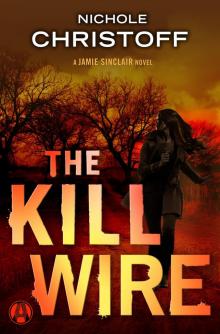 The Kill Wire
The Kill Wire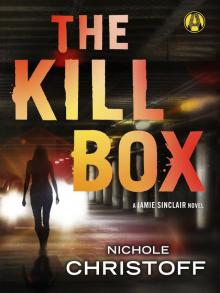 The Kill Box
The Kill Box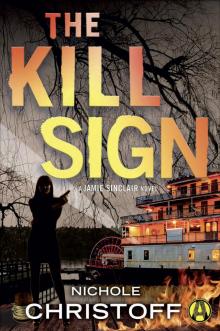 The Kill Radius
The Kill Radius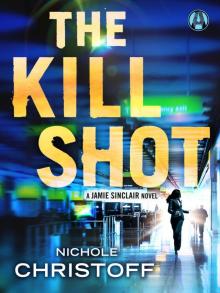 The Kill Shot
The Kill Shot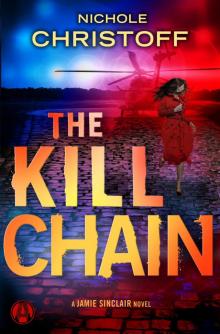 The Kill Chain
The Kill Chain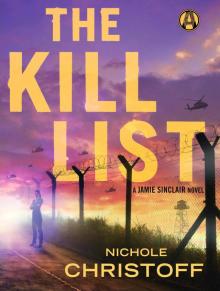 The Kill List
The Kill List